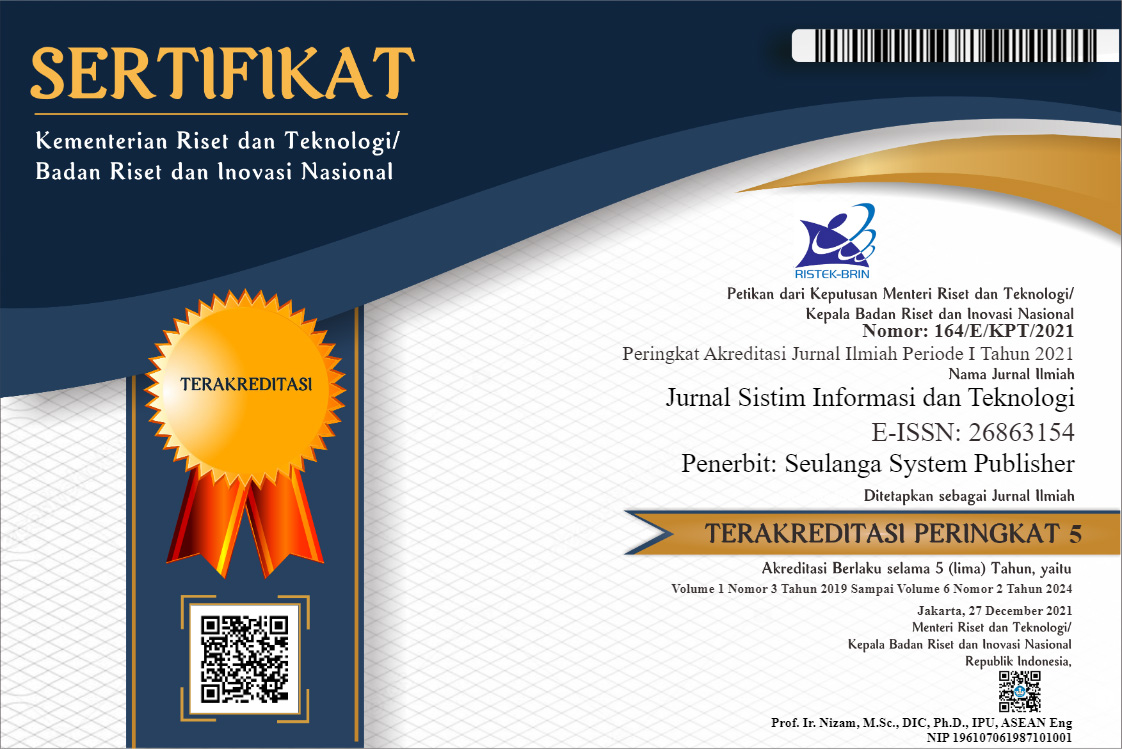Analisis Penerimaan terhadap Penggunaan E-Learning Menggunakan Metode Technology Acceptance Model (TAM)
DOI:
https://doi.org/10.37034/jsisfotek.v4i1.120Keywords:
E-learning, Moodle, Partial Least Square-Structural Equation Modeling (PLS-SEM), Networking, Technology Acceptance Model (TAM)Abstract
E-learning merupakan sistem pembelajaran berbasis jaringan. UIN Sultan Syarif Kasim Riau telah lama memiliki e-learning yang berbasis Moodle, namun pada saat ini e-learning UIN Suska Riau digunakan secara masif. Pengguna utama e-learning ini adalah mahasiswa dan dosen, dalam penggunaan e-learning terdapat kendala yaitu pengguna kesulitan dalam memahami fitur dan kurangnya sosialisasi dalam penggunaan e-learning. Kendala yang dialami akan mempengaruhi dari penerimaan pengguna e-learning. Tujuan penelitian ini untuk mengetahui penerimaan dari penggunaan e-learning. Metode Technology Acceptance Model (TAM) dapat mengukur tingkat penerimaan pengguna, dalam penelitian ini terdapat tiga variabel metode TAM yang sudah dimodifikasi yaitu variabel persepsi kegunaan (Perceived Usefulness), variabel kemudahan penggunaan (Perceived Easy of Use) dan variabel penerimaan (Acceptance of IT). Sampel penelitian adalah mahasiswa 100 orang dan dosen 40 orang, Analisis proses data menggunakan PLS-SEM dengan SmartPLS 3.0. Hasil hipotesis yang diperoleh pada responden dosen dan mahasiswa adalah variabel Perceived Usefulness, Perceived Ease of Use terdapat pengaruh positif terhadap Acceptance of IT. Kesimpulannya adalah pengguna dapat menerima dari penggunaan e-learning.
References
. Sukendro, S., Habibi, A., Khaeruddin, K., Indrayana, B., Syahruddin, S., Makadada, F. A., & Hakim, H. (2020).“Using an extended Technology Acceptance Model to understand students’ use of e-learning during Covid-19: Indonesian sport science education context.” Heliyon, 6(11), e05410. https://doi.org/10.1016/j.heliyon.2020.e05410
. Almanthari, A., Maulina, S., & Bruce, S. (2020).”Secondary school mathematics teachers’ views on e-learning implementation barriers during the COVID-19 pandemic: The case of Indonesia.”Eurasia Journal of Mathematics, Science and Technology Education, 16(7), em1860. https://doi.org/10.29333/ejmste/8240
. Hussein, Z. (2017). Leading to intention: The role of attitude in relation to Technology Acceptance Model in e-learning . Procedia Computer Science, 105, 159-164. https://doi.org/10.1016/j.procs.2017.01.196
. Al Kurdi, B., Alshurideh, M., Salloum, S., Obeidat, Z., & Al-dweeri, R. (2020).”An empirical investigation into examination of factors influencing university students’ behavior towards elearning acceptance using SEM approach.” https://doi.org/10.3991/ijim.v14i02.11115
. Maita, I., Indrajit, R. E., & Irmayani, A. (2018, April).”User behavior analysis in academic information system using unified theory of acceptance and use of technology (UTAUT).”In Proceedings of the 2018 International Conference on Internet and e-Business (pp. 223-228). https://doi.org/10.1145/3230348.3230351
. Al Kurdi, B., Alshurideh, M., & Salloum, S. A. (2020). Investigating a theoretical framework for e-learning technology acceptance. International Journal of Electrical and Computer Engineering (IJECE), 10(6), 6484-6496. DOI: 10.11591/ijece.v10i6.pp6484-6496
. Abdullah, F., & Ward, R. (2016).”Developing a General Extended Technology Acceptance Model for E-learning (GETAMEL) by analysing commonly used external factors.” Computers in human behavior, 56, 238-256. https://doi.org/10.1016/j.chb.2015.11.036
. Salloum, S. A., Alhamad, A. Q. M., Al-Emran, M., Monem, A. A., & Shaalan, K. (2019).”Exploring students’ acceptance of e-learning through the development of a comprehensive technology acceptance model.”IEEE Access, 7, 128445-128462. Doi:10.1109/Access.2019.2939467
. Al-Qaysi, N., Mohamad-Nordin, N., & Al-Emran, M. (2020).”A systematic review of social media acceptance from the perspective of educational and information systems theories and models.”Journal of Educational Computing Research, 57(8), 2085-2109. https://doi.org/10.1177%2F0735633118817879
. Baber, H. (2021).”Modelling the acceptance of e-learning during the pandemic of COVID-19-A study of South Korea.”The International Journal of Management Education, 19(2), 100503. https://doi.org/10.1016/j.ijme.2021.100503









